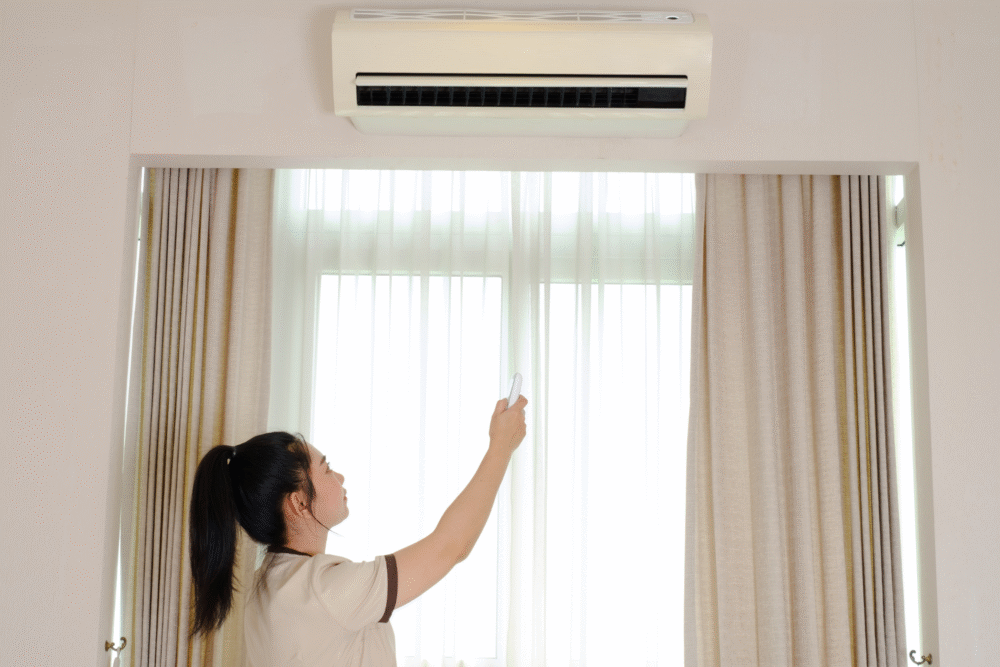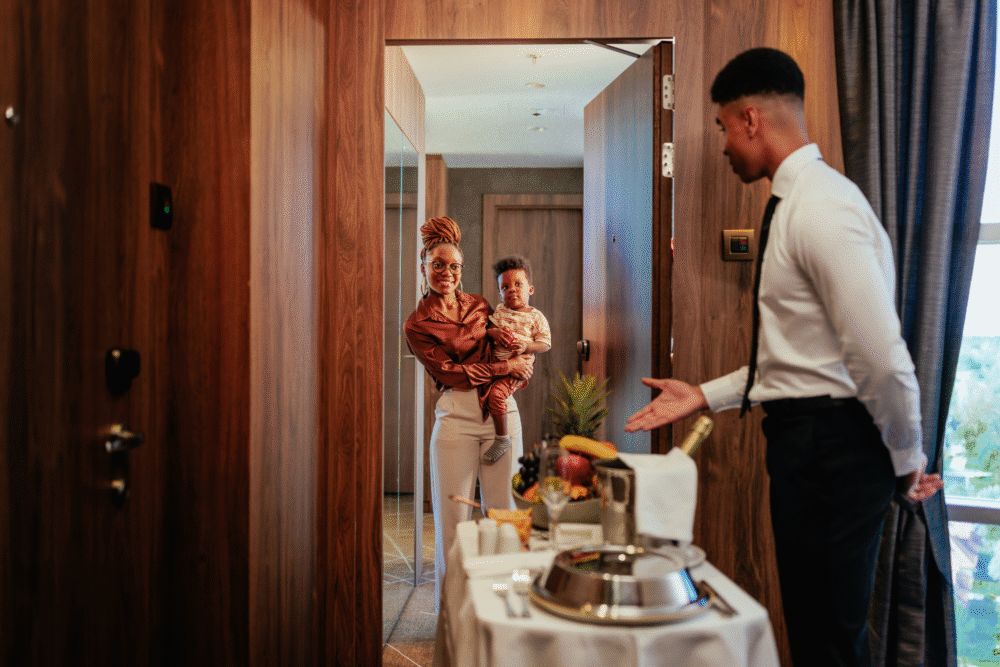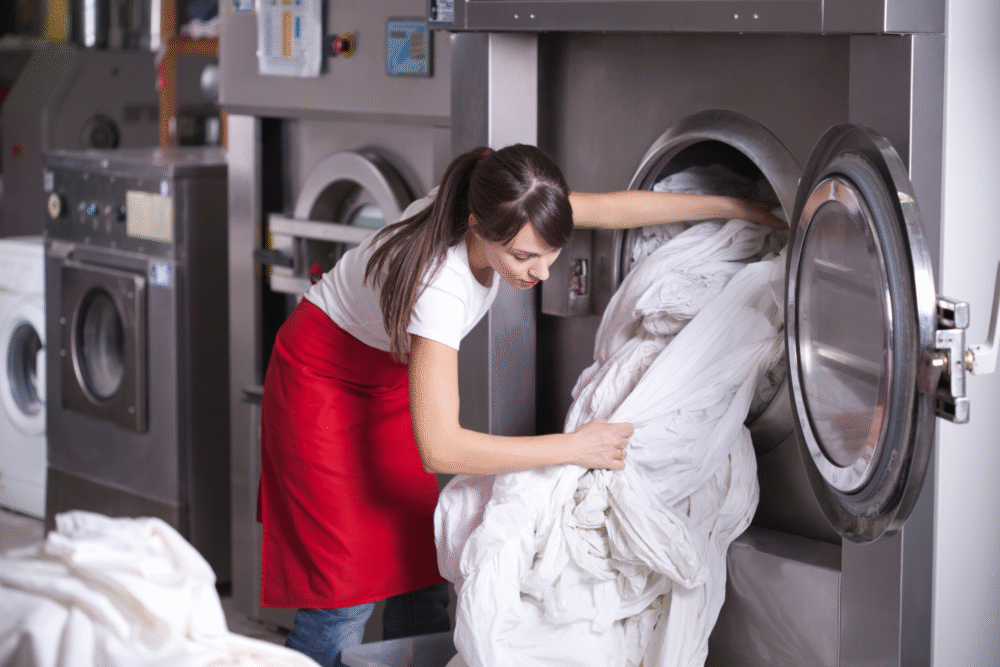You may want to pack extra: these once-standard comforts are on the chopping block.

If you’ve grown used to free air conditioning, endless towel swaps, and breakfast buffets piled high, your next European vacation might look a little different. The European Union is rolling out strict new climate regulations aimed at cutting carbon emissions from the tourism and hospitality sectors.
Hotels are being pushed to conserve energy, reduce waste, and rethink luxury through a green lens. While the planet may benefit, travelers could see some beloved comforts scaled back or disappear entirely. These hotel perks could become rare—or vanish altogether—as climate-conscious laws reshape the European travel experience.
1. Unlimited air conditioning could soon be history.

To meet new energy efficiency targets, many hotels are installing systems that limit A/C use based on occupancy or outdoor temperatures. Guests might find that air conditioning only works during certain hours or that temperatures are capped. This means no more cranking it down to arctic levels on a hot day.
While it’s a nod to sustainability, travelers used to complete climate control may need to adjust expectations. It’s not about discomfort—it’s about using less energy. And with rising heatwaves, the new norm may be sweating a little for the sake of a cooler planet.
2. Daily towel and linen changes may become a thing of the past.

Gone are the days when you could toss your towels on the floor and expect them replaced by noon. New EU guidelines are pushing hotels to adopt resource-saving laundry practices. Many will now only refresh towels or linens every few days—or when specifically requested. It’s a move to reduce water and chemical waste, especially in regions facing droughts.
While some guests already opt for this in the name of sustainability, others may need to shift their mindset from “fresh daily” to “fresh when needed.” It’s a small change that adds up to big environmental savings.
3. Miniature toiletries are on their way out.

Those cute little shampoo and body lotion bottles? They’re quickly becoming hotel relics. As part of the EU’s crackdown on single-use plastics, hotels are replacing mini toiletries with refillable dispensers. It’s part of a larger push to cut plastic waste and lower the carbon footprint of packaging.
While the aesthetics may shift, the function remains the same—and you’ll no longer feel bad about taking those bottles home. Some luxury properties are turning this into an upgrade with locally made products in elegant, eco-friendly containers. It’s a small step with a big environmental payoff.
4. 24/7 lighting in hallways and public spaces may go dim.

Expect motion-sensor lighting and timed shut-offs in common areas like hallways, stairwells, and lobbies. Energy-efficiency rules are encouraging hotels to cut electricity use, especially in non-essential spaces. That means the warmly lit hallways you’re used to might now light up only when you walk through them.
It’s an adjustment, especially if you’re arriving late or navigating the hotel in the early morning. But it’s also a smart way to reduce emissions without sacrificing safety or convenience. Think of it as part of a growing movement toward smarter, greener hospitality.
5. Lavish breakfast buffets could be replaced with leaner options.

The massive spread of eggs, meats, cheeses, pastries, and fruit may shrink to a more modest offering. The EU’s climate goals include food waste reduction, and buffets are notorious for tossing out uneaten items. Hotels may shift to à la carte menus, pre-ordered breakfast, or set portions.
It not only cuts waste—it often improves quality. Travelers might lose the thrill of grazing endlessly, but they’ll gain more mindful dining and potentially fresher food. Plus, reducing overconsumption is better for the environment—and your waistline.
6. Round-the-clock room service may be scaled back or eliminated.

Keeping a full kitchen running all night burns more than just midnight oil—it consumes a lot of energy. Hotels adapting to new energy-use regulations are likely to shorten room service hours or shift to limited late-night menus. This move conserves electricity, staffing, and food.
Instead of a full-service meal at 2 a.m., you might be offered a selection of shelf-stable or locally sourced snacks. It’s a big shift for luxury travelers, but one that aligns with broader efforts to reduce emissions tied to food preparation and labor.
7. Heated outdoor pools and spas may become seasonal or limited.

That blissfully warm rooftop pool in the middle of winter might be a fading luxury. With climate regulations clamping down on excess energy use, heating outdoor pools and jacuzzis year-round is becoming harder to justify. Hotels may restrict use to warmer months or implement temperature caps.
The aim is to cut down on fossil fuel consumption used for heating large volumes of water. While spa lovers may miss the indulgence, this change reflects a global need to balance comfort with conservation. Cooler dips may soon be the sustainable—and expected—choice.
8. Daily housekeeping could switch to every other day.

In the name of labor reduction and energy savings, some hotels are scaling back daily cleaning schedules unless guests opt in. Vacuuming, sanitizing surfaces, and laundering items all require power and resources.
Climate laws are nudging hotels to offer “on-demand” housekeeping rather than standard daily service. It’s not about cutting corners—it’s about cutting emissions. For travelers, this could mean a cleaner conscience instead of a freshly made bed every morning. And honestly, how often do we vacuum at home on vacation anyway?
9. Complimentary water bottles may disappear from your room.

Plastic water bottles are often among the first casualties in a hotel’s eco overhaul. With plastic reduction goals taking center stage, more hotels are switching to filtered water stations and refillable glass jugs in rooms.
Some guests may initially miss the convenience, but this shift reduces plastic waste and supports more sustainable water use. In some cases, hotels are even partnering with local bottlers or spring water providers to offer a greener alternative. It’s a small inconvenience with a big ripple effect—especially when multiplied across thousands of hotel rooms nightly.
10. Hotel laundries may set limits on guest clothing washing.

If you’ve relied on hotel laundry services to refresh your suitcase mid-trip, prepare for new restrictions. Regulations targeting energy and water consumption are likely to lead to laundry limits—like minimum loads, restricted service hours, or air-dry options only. While this may sound inconvenient, it’s a push to make hospitality operations more efficient.
Guests may need to plan ahead or wash a few essentials by hand. The upside? Many hotels are using this as an opportunity to invest in greener laundry technologies, like ozone systems or energy-saving machines.
11. Airport shuttle services may shift to greener or less frequent models.

Complimentary shuttles—especially gas-powered ones—are under scrutiny. As transport emissions come under tighter regulation, hotels may switch to electric vehicles, shared ride programs, or reduce the frequency of airport runs altogether. Guests should expect to pre-schedule rides or pay small fees to help cover the cost of eco-friendly alternatives.
While it may not be as seamless as a constant loop service, the environmental benefit is undeniable. The future of hotel transit will be smarter, greener, and more efficient—even if it means a little more planning on your part.
